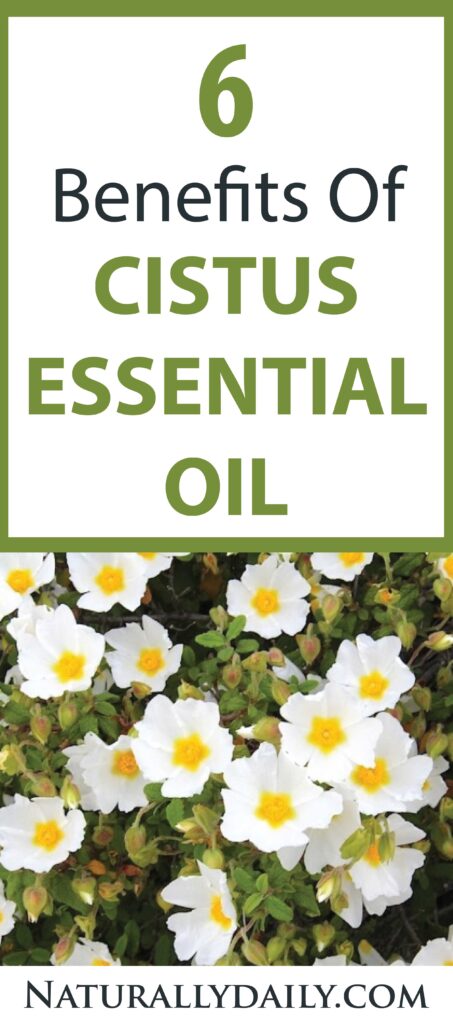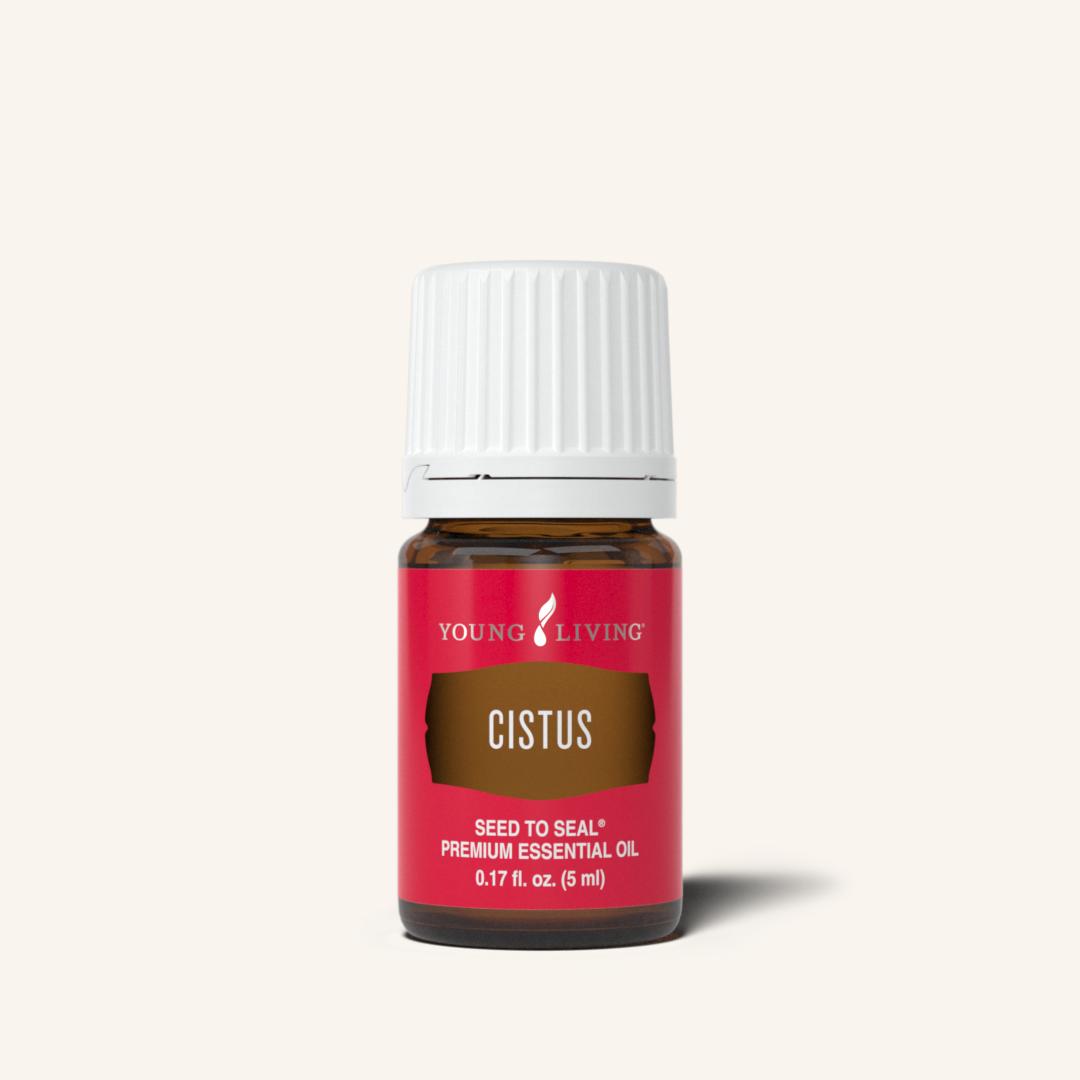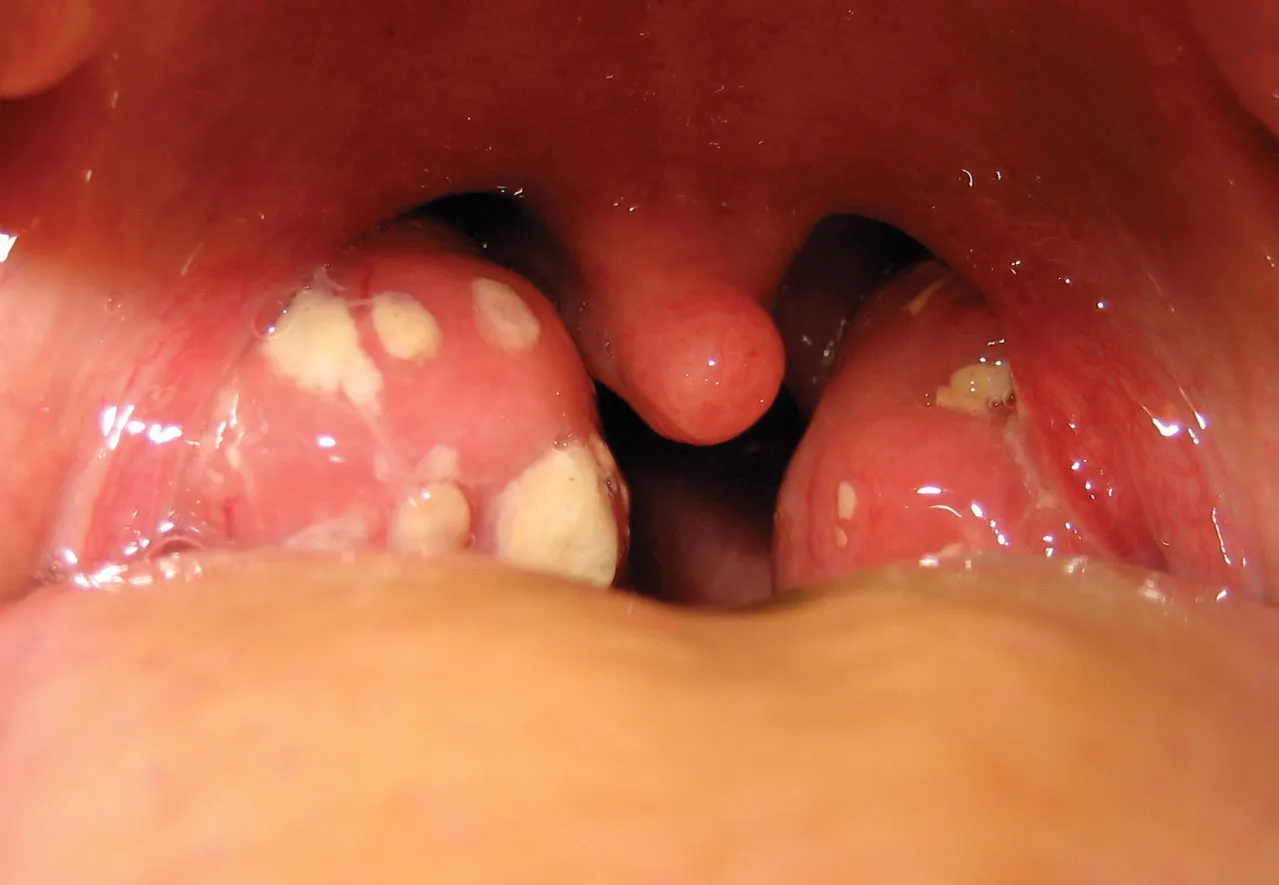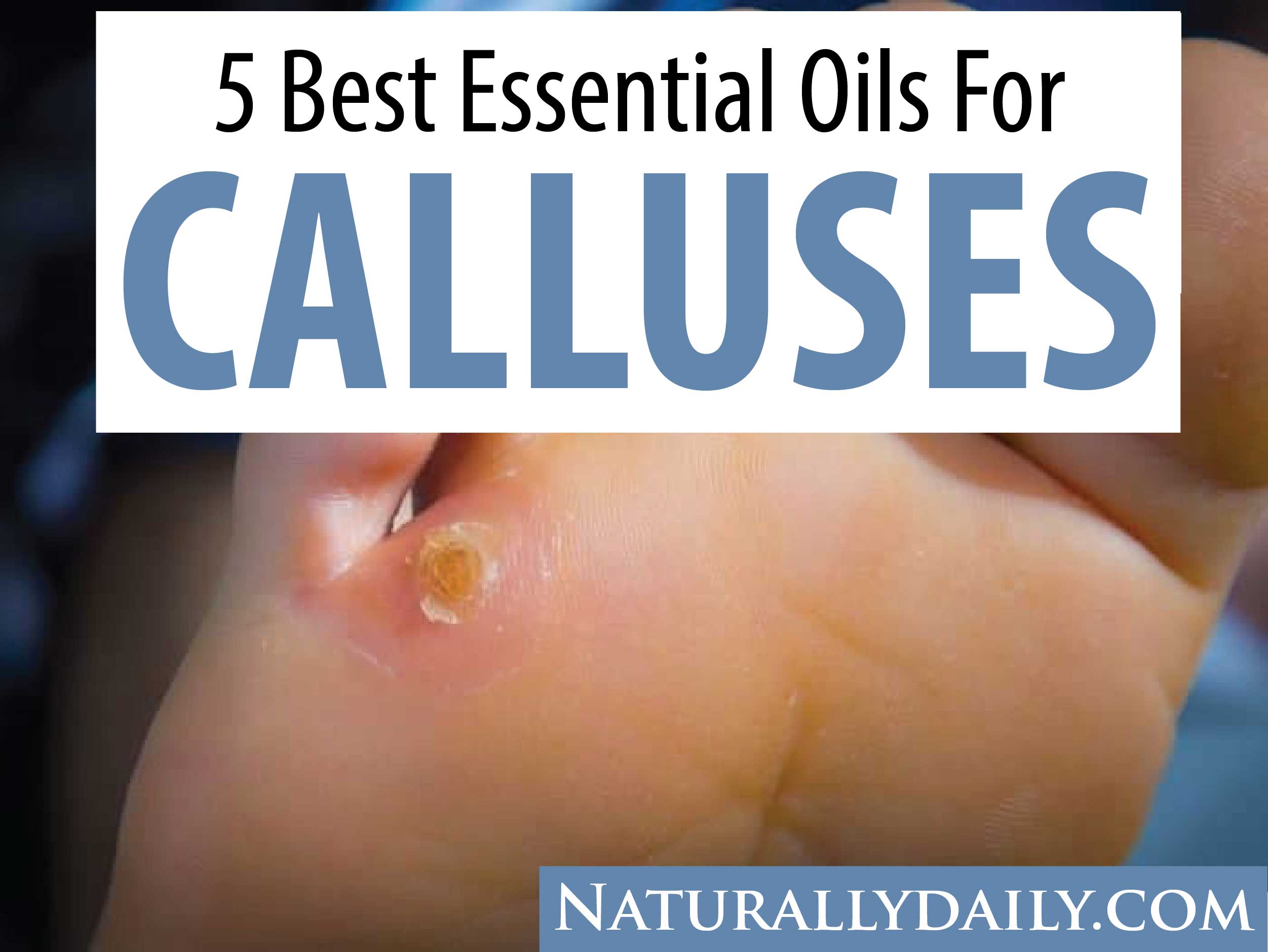Cistus essential oil is steamed and distilled from the flowers and leaves of the Cistus laniferous plant. The small shrub is native to the Mediterranean region. The golden yellow oil has a herbaceous, woody, and slightly floral aroma. Cistus oil is also called Rock Rose oil or Labdanum oil.
The entire cistus plant and its white flowers with red marks have had medicinal uses since ancient times. In Egypt, people used cistus resins as perfume and incense in religious rituals. The therapeutic use of the cistus plant, flowers, and essential oil in Europe began in the middle ages. Cistus is a traditional home remedy for wounds, stomach disorders, diarrhea, phlegm, congestion, etc.
Modern clinical research has found numerous therapeutic benefits of cistus oil components. For example, Cistus essential oil may be an effective remedy for various skin disorders, inflammations, pain, respiratory problems, etc.
This article reviews cistus essential oil’s chemical compounds, therapeutic efficacy, and health benefits.
Cistus Oil- Chemical Compounds and Therapeutic Effects
Researchers have discovered numerous chemical compounds in cistus oil that have potent medicinal qualities. Some of the major chemical compounds of the oil include — A-pinene, Camphene, P-cymene, Bornyl acetate, Trimethylcyclohexanone, Limonene, Trans-pinocarveol, Hexen-1-ol, Y-terpinene, and Viridiflorol.
These bioactive components have potential analgesic, expectorant, anti-inflammatory, astringent, antimicrobial, mucolytic, cicatrizant, emmenagogic, antiseptic, nervine, vulnerary, and sedative effects.
Potential Health Benefits of Cistus Essential Oil
1. Cistus Oil May Heal Wounds
Since ancient times cistus oil has been a traditional remedy for healing wounds and related skin infections.
Recent clinical data confirm the natural vulnerability and cicatrizant properties in cistus oil. This oil may have positive effects on healing scar tissues and wounds.
In a 2017 evidence-based Complementary and Alternative Medicine journal, researchers suggested cistus oil’s wound healing and bacteria-fighting efficacy.
In the study, cistus oil properties showed faster-wound healing capabilities. In addition, the antiseptic and antibacterial effects of the oil could inhibit bacterial growth, such as Staphylococcus aureus (staph) infection. Cistus oil may also slow down the excessive bleeding of a fresh wound.
Several other research studies claim that the oil has therapeutic effects on sores, ulcers, and varicose ulcers.
You can dilute 2-3 drops of cistus oil with any carrier oil and apply it to the fresh wound. Cover the damage with a bandage for faster healing and to prevent pathogenic microbes from coming in contact.
2. Cistus Oil May Be Effective for Various Skin Conditions.
Dermatologists suggest that cistus oil may have several benefits for the skin.
Recent clinical studies have speculated the potential therapeutic effects of cistus oil in treating age spots, fine lines, wrinkles, oily skin, acne, eczema, psoriasis, and scars.
The astringent and antiseptic qualities of the oil can clean and open the blocked skin pores and prevent the chances of acne inflammations. In addition, Cistus oil works well on oily skin and may regulate the natural sebum production of the skin and prevent inflammatory breakouts.
The antibacterial qualities of this oil can fight acne. Moreover, the oil has moisturizing effects on dry skin and eczema problems. A Cell Biology and Toxicology study suggests that cistus extracts’ antioxidant qualities can prevent oxidative damage to the skin and keep away free radicals.
A topical application of rock rose oil blended with other skin beneficial essential oils, moisturizers, etc., may improve the tone and complexion of your skin. In addition, it can reduce the chances of skin infections and other skin disorders.
3. Cistus Essential Oil May Relieve Respiratory Disorders.
Traditionally, cistus oil is used for numerous respiratory problems, such as phlegm, excessive mucus formation, chest congestion, and blocked sinuses.
Science has found the mucolytic and expectorant properties in cistus oil that may clear the respiratory organ blockages. Moreover, the oil’s antibacterial effects can prevent the harmful microbes that may lead to respiratory infections.
To relieve nasal, sinus, and chest congestion, mix 2-3 drops of rock rose oil in warm water for stem therapy. Or use a diffuser to diffuse 8-10 drops of cistus oil in your living space for easy breathing.
4. Cistus Oil May Relieve Pain and Inflammations.
Cistus oil’s analgesic and anti-inflammatory properties may be an effective remedy for muscle pain, inflammatory joint pains, arthritis, backaches, etc.
A 2016 American Journal of Therapeutics study evaluated the pain-relieving and anti-inflammatory effects of cistus leaf extracts in animals.
In the study, various doses of cistus extracts could significantly reduce the pain and inflammation in the rats.
You can dilute 2-3 drops of cistus oil with any essential oil for a pain-relieving massage. Moreover, you may add 8-10 drops of the oil to your warm shower water to reduce body aches and pains.
5. Cistus Oil May Have Anti-Tumor and Anti-Cancer Effects.
Cistus oil may inhibit cancerous tumor growth in the body.
A 2013 study in the Chemical Central Journal shows the antiproliferative effects of human Tunisian cistus plants.
The researchers experimented with the efficacy of the phytochemicals in cistus plants, especially Hexen-1-ol, on human skin cancer and breast cancer cells.
The result showed inhibitory effects of the compound on cancerous cell growth.
6. Cistus Oil has Calming, and Sedative Qualities.
Cistus resins and oil had traditional uses in religious ceremonies as incense. In addition, the mild and warm aroma of the oil can boost spiritual practices and aid in meditation and yoga.
Recent medical research found that the sedative qualities of the oil can enhance your mood and sleep quality.
Precautions for Using Cistus Oil
You should never consume cistus oil. For topical use, you must dilute the oil with a carrier oil. A patch test may help you detect any allergic reactions to cistus oil. Pregnant and breastfeeding mothers must consult a doctor before using the essential oil.
Bottom Line
Cistus essential oil comes from the flower tops and leaves of the Mediterranean Cistus laniferous plant. The plant extracts and their essential oil has traditional medicinal uses in different parts of the world.
Modern clinical studies found the therapeutic effects of the primary constituents of cistus oil. The essential oil may be an effective remedy for wounds, ulcers, bacterial and inflammatory skin conditions, respiratory problems, and pain.
Read Next: Lemon Verbena Essential Oil: Research-Backed Benefits & Uses






